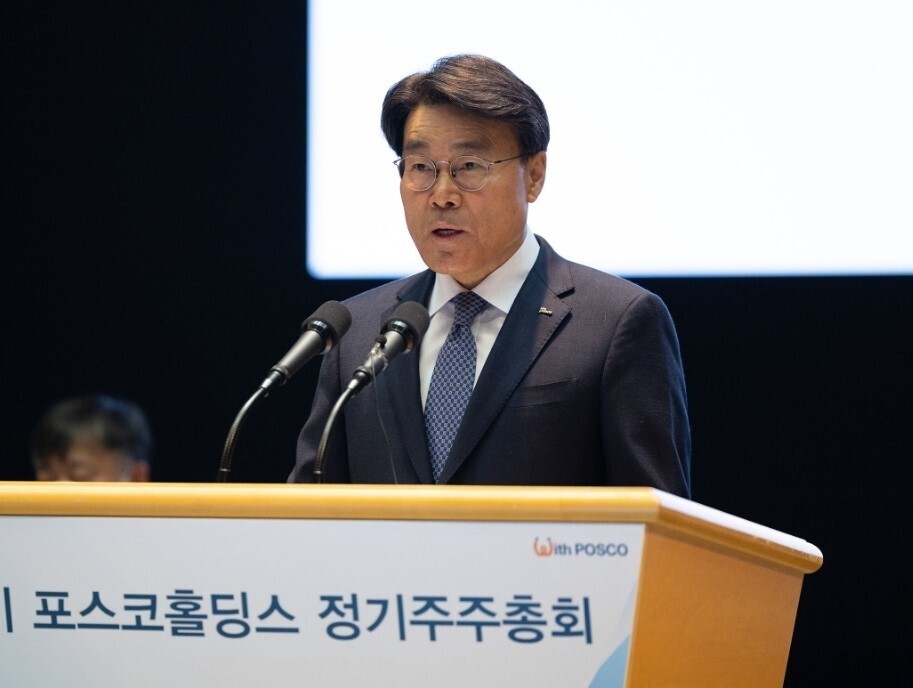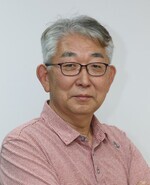hankyoreh
Links to other country sites 다른 나라 사이트 링크
[Column] The significance of POSCO’s chairman not seeking 3rd term


By Kwack Jung-soo, senior staff writer at Hankyoreh Economy & Society Research Institute
Choi Jeong-woo will not seek a third term as chairman of POSCO Holdings. Some say he has stepped down amid pressure from South Korean President Yoon Suk-yeol and his administration, but I don’t think Choi’s decision is a bad move — for both himself and the company.
Around 10 years ago, I had a casual chat with the chairman of POSCO at the time. It was a sensitive time, right after a change in administrations. At the risk of sounding rude, I suggested that he step down as chairperson. The new administration was sure to demand his resignation and replace him with someone more suitable to their political palate, so why not take the initiative and resign voluntarily? I also proposed that Posco reform its nepotistic practice of the chairperson appointing themselves as CEO, to appoint a new CEO based on qualifications and capacity rather than connections.
I said that he could put an end to POSCO’s reputation of offering its CEO position as the spoils of war in internal power struggles, regain the respect of the public, and exit the game as a CEO whom his successors could look up to. Unfortunately, he did not accept my proposal. In the end, he didn’t make it very far. He resigned a few months later.
POSCO’s current situation isn’t much different. The Yoon administration has not been shy in its pressure campaign for Choi to step down. Choi has been excluded from various economic forums and from Yoon’s economic delegation comprising leaders of the country's major conglomerates. Yoon has summoned other conglomerate figures to bolster his “sales diplomacy” campaigns to the point of excess. Yet Choi, the chairman of Korea’s fifth-largest conglomerate, has yet to receive a personal summons from Yoon. The reason is obvious, even to a child.
Choi, however, made a surprise move. He didn’t fold, and served the remainder of his term as chairperson. This was the first time a POSCO chairperson served their full term since 1991 — a whopping 31 years. Following the resignation of Hwang Kyung-no, the second-ever chairperson of the group, not a single successor — Chung Myung-sik, Kim Man-je, Yoo Sang-boo, Lee Ku-taek, Chung Joon-yang, Kwon Oh-joon — has successfully served his full term. The powers that be surely mustered all their resources to find and target Choi’s weakness. The fact he survived paradoxically proves his closet to be free of skeletons.
At the end of last year, Choi disbanded the conglomerate’s policy of favoring the incumbent chairperson in successive nominations and moved to dismantle unfair advantages POSCO has historically granted to incumbents. Now, he has given up his bid for a third term.
Choi has instigated what I recommended 10 years ago to the chairperson at the time. Choi’s performance in the past five years is more than enough to warrant a third term, as he paved the way for POSCO’s transformation from a steelmaking company to an eco-friendly future materials company in this era of carbon neutrality by investing in new growth sectors such as rechargeable battery materials, energy, and hydrogen businesses. His renouncement of a third term should be read as a sacrifice made to prevent any interventions from external powers.
POSCO is a national company built on precious taxpayer money, as well as from funds received from the Japanese government in the 1965 claims agreement between South Korea and Japan. In the 50 years since its founding, it has played an important role in South Korea’s economic development with its belief that it will contribute to the country with steel, the bread and butter of industry.
However, after founder Park Tae-joon was ousted for not supporting President Kim Young-sam in the 1992 presidential election, the country’s shameful history regarding its CEOs continued.
After it went private in 2000, the government no longer had a stake in the steelmaker. Yet it continues to intervene in issues of company personnel and has sought to pursue its own interests with the conglomerate.
POSCO is facing numerous challenges, such as geopolitical crises, an intensifying US-China hegemonic rivalry, reorganizations of supply chains, a slump in the global economy, and the climate crisis, which calls for a fundamental change in the production of steel.
Will a CEO who is unqualified and has been handed the role because it suits the interests of certain people be seen by investors as someone who can successfully present a company’s vision? Will they be able to stand on their own two feet within the company? It’s safe to say that a company with a CEO who is not trusted by the market or by the business itself stands on shaky ground.
Choi’s duties are far from over. He must assist the CEO nomination committee, composed of outside directors, select an independent successor who is competent, qualified, and shows leadership at the shareholder meeting in March.
Candidates jockeying for power, whether they currently work for POSCO or not, should be firmly ruled out. The next team of executives needs to establish a holistic succession system, including a training program for successors.
The group composed of retired executives, known as the “jungwoohoe,” should also act as a robust safeguard.
In order for POSCO’s shameful history with its CEOs to end, the government must change its perspective.
President Yoon Suk-yeol has called for an economy driven by the market and private sectors. However, in the name of preventing “self-reappointment,” he has used the national pension fund to intervene in POSCO after doing the same with KT and Woori Bank.
Such interventions are unreasonable now that POSCO has done away with the privilege of self-appointment.
Yoon has recently emphasized the elimination of the “Korea discount,” which refers to the relative undervaluation of South Korean stocks compared with that of other Asian countries. The real solution to the Korea discount is not the abolition of the financial investment income tax, a move which would not be tax equitable, but the elimination of abuse of authority by heads of chaebol and the expurgation of the backward system of government involvement in the personnel appointments of private companies.
Please direct questions or comments to [english@hani.co.kr]

Editorial・opinion
![[Guest essay] Preventing Korean Peninsula from becoming front line of new cold war [Guest essay] Preventing Korean Peninsula from becoming front line of new cold war](https://flexible.img.hani.co.kr/flexible/normal/500/300/imgdb/original/2024/0507/7217150679227807.jpg) [Guest essay] Preventing Korean Peninsula from becoming front line of new cold war
[Guest essay] Preventing Korean Peninsula from becoming front line of new cold war![[Column] The state is back — but is it in business? [Column] The state is back — but is it in business?](https://flexible.img.hani.co.kr/flexible/normal/500/300/imgdb/original/2024/0506/8217149564092725.jpg) [Column] The state is back — but is it in business?
[Column] The state is back — but is it in business?- [Column] Life on our Trisolaris
- [Editorial] Penalties for airing allegations against Korea’s first lady endanger free press
- [Editorial] Yoon must halt procurement of SM-3 interceptor missiles
- [Guest essay] Maybe Korea’s rapid population decline is an opportunity, not a crisis
- [Column] Can Yoon steer diplomacy with Russia, China back on track?
- [Column] Season 2 of special prosecutor probe may be coming to Korea soon
- [Column] Park Geun-hye déjà vu in Yoon Suk-yeol
- [Editorial] New weight of N. Korea’s nuclear threats makes dialogue all the more urgent
Most viewed articles
- 1Yoon’s broken-compass diplomacy is steering Korea into serving US, Japanese interests
- 2[Guest essay] Preventing Korean Peninsula from becoming front line of new cold war
- 3Yoon’s revival of civil affairs senior secretary criticized as shield against judicial scrutiny
- 4Behind-the-times gender change regulations leave trans Koreans in the lurch
- 5South Korean ambassador attends Putin’s inauguration as US and others boycott
- 6Japan says its directives were aimed at increasing Line’s security, not pushing Naver buyout
- 7Lee Jung-jae of “Squid Game” named on A100 list of most influential Asian Pacific leaders
- 8Family that exposed military cover-up of loved one’s death reflect on Marine’s death
- 9Amid US-China clash, Korea must remember its failures in the 19th century, advises scholar
- 10S. Korean first lady likely to face questioning by prosecutors over Dior handbag scandal